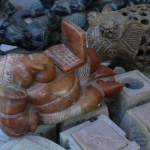MJ Akbar is a shrewd comemtator on Indp-Pak relationship. Here he writes about what leads the Pakistani establishment to fight us and the times they undertake those actions. He argues it is not the personalities that trigger actions, but the evaluation of an “opportunity” and perceived ease of achieving what they want. From Jinnah to Musharraf, the story has been the same! A euphoric belief that something can be achieved and a complete miscalculation – even after four defeats – of the Indian reaction. I am reproducing it because it is so well written.
Islamabad’s policy towards Kashmir is calibrated on a sensitive thermometer that measures the fever between circumstance and opportunity. This was true of October 1947, when Jinnah launched a war for the Valley after the peaceful resolution of Kashmir through negotiations with Nehru and the Maharaja, with Britain as the fourth party at the table, became inevitable. All three, India, Pakistan and Britain, were agreed that independence was not on offer. Jinnah was convinced that Nehru’s inexperienced government, unable to control a raging Hindu-Muslim civil war, would be incapable of fighting back a “tribal incursion” and he would be able to join the congregation on the first Friday prayers at the grand mosque in Srinagar within days of the Pak-sponsored “uprising”.
In 1965, Ayub Khan saw an opportunity in three critical facts: the humiliation of the Indian Army on the China border three years before; a Congress bereft of Nehru, who died in 1964; and a Kashmir still in the tremors of an unprecedented upsurge over the mysterious disappearance (and even more mysterious reappearance) of the mo-e-muqaddas, a strand of hair from the beard of the Holy Prophet of Islam.
There is still some dispute as to who launched Kargil, but the evidence points to a still-unknown general, Pervez Musharraf. He saw a fragile coalition in Delhi led by BJP, and became convinced that he could creep up and take up impregnable positions astride vital communication lines while his prime minister, Nawaz Sharif, twiddled his hamburgers in Islamabad. The Pak army did not envisage a larger conflict because it had realized, as early as the early 1980s, that a conventional war with India was no longer winnable.
The despot who ruled the country then, General Zia-ul Haq, therefore stabilized relations on the surface and undermined them below eye-level through blatant support for secessionism in Punjab and Kashmir. The background and character of each man, whether democrat or dictator, had less to do with what he did than circumstance and opportunity. If India provides the opening, a Pakistani leader will seize the chance to change the status of the Kashmir valley. The latest Pakistani threat to take Kashmir back to the top of the agenda at the United Nations has come not from a dictator but a democrat.














